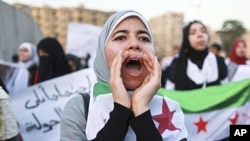GENEVA - The United Nation’s top Human Rights Official, Navi Pillay, says the Syrian government of President Bashar al-Assad may be guilty of war crimes for the killing of innocent civilians. In an opening speech to the 20th session of the UN Human Rights Council, the High Commissioner highlighted a number of global human rights crises that deserve international attention and protection. Pillay said she was speaking out against what she called a backdrop of crises around the globe. Chief among them is Syria. She says the suffering of civilians is increasing significantly as the situation in Syria continues to deteriorate.
She says the escalating violence in the country forced UN observers to suspend their operations a few days ago, and this suspension comes while innocent civilians are being killed every day.
She noted the UN observers are under constant threat. Daily attacks against their convoy have prevented them from visiting towns and villages where fighting is raging to document grave human rights violations.
“All violations of the human rights of the Syrian people at the hands of all parties to the conflict must end," she said. "The Government of Syria should immediately cease the use of heavy armaments and shelling of populated areas, as such actions amount to crimes against humanity and possible war crimes.”
Pillay urged nations to overcome their differences and work to end the violence as well as human rights violations against the people of Syria. She says all those guilty of crimes, including those who have attacked UN observers, must be brought to justice.
Switching to other troubled parts of the world, in Africa, the High Commissioner expressed deep concern about the situation in Mali. She says security and human rights have significantly deteriorated in the whole Sahel region since the military coup. She noted human rights abuses and the disruption of basic services in northern Mali have led to a massive displacement of people.
South Sudan was also highlighted because of the thousands of Sudanese refugees fleeing into the country to escape fighting and food shortages. But, Pillay points out that persistent inter-communal violence is also threatening South Sudan’s ability to build up its institutions and create a rights-based society.
Elsewhere in the Horn of Africa, Pillay says the human rights situation in Eritrea is of deep concern.
“Credible sources indicate that violations of human rights include arbitrary detention, torture, summary executions, forced labor, forced conscriptions, and restrictions to freedoms of movement, expression, assembly and religion," said Pillay. "There are an estimated 5,000 to 10,000 political prisoners.”
The High Commissioner says, so far, she has received no response from Eritrea to her proposal to send a mission to the country to assist the Government in improving its human rights situation.
Elsewhere, Pillay urged North Korea's neighbors not to deport North Korean refugees to their country where their lives could be in danger. She condemned an increase in violence against journalists in several countries in Latin America, particularly Mexico and Honduras.
Pillay also expressed concerns over the continuing use of armed drones for targeted attacks in Pakistan. She said it is unclear that all of those targeted are combatants or directly participating in hostilities.
UN Official Says Syria May Be Guilty Of War Crimes




